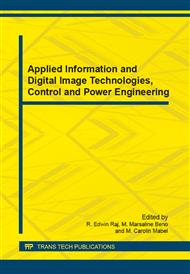[1]
X. Wang, Mc Donald, Modern Power System Planning, McGraw-Hill International Limited, Singapore, p.311–373 ( 1994).
Google Scholar
[2]
Jose L. Ceciliano Meza, Mehmet Bayram Yildirim, and Abu S. M. Masud, A Multiobjective Evolutionary Programming Algorithm and Its Applications to Power Generation Expansion Planning, IEEE Trans, Man And Cybernetics Systems and Humans, 39 (5) (2009).
DOI: 10.1109/tsmca.2009.2025868
Google Scholar
[3]
P. Murugan, S. Kannan, and S. Baskar, Application of NSGA-II Algorithm to Single-Objective Transmission Constrained Generation Expansion Planning, IEEE Trans. Power systems 24 (4) (2009)1790-1797.
DOI: 10.1109/tpwrs.2009.2030428
Google Scholar
[4]
P. Murugan, S. Kannan, S. Baskar, NSGA-II algorithm for multi- objective generation expansion planning problem, Electric Power Systems Research 79(2009) 622–628.
DOI: 10.1016/j.epsr.2008.09.011
Google Scholar
[5]
Jong-Bae Park, Young-Moon Park, Jong-Ryul Won, and Kwang Y. Lee, An Improved Genetic Algorithm for Generation Expansion Planning, IEEE Trans. Power systems 15 (3) (2000) 916-922.
DOI: 10.1109/59.871713
Google Scholar
[6]
A.K. David, Zhao Rongda, An Expert System With Fuzzy Sets For Optimal Planning, IEEE Trans. Power systems 6 (1) (1991) 59-65.
DOI: 10.1109/59.131092
Google Scholar
[7]
David E. Goldberg, JH Holland, Genetic algorithms and machine learning, Springer Netherlands, 3 (2) (1988) 95- 99.
Google Scholar
[8]
S. Kannan, S. Mary Raja Slochanal, P. Subbaraj, Narayana Prasad Padhy, Application of particle swarm optimization technique and its variants to generation expansion planning problem, Electric Power Systems Research, 70 (2004) 203-210.
DOI: 10.1016/j.epsr.2003.12.009
Google Scholar
[9]
Hamid Bouzeboudia, Abdelkader Chaker, Ahmed Allali, Bakhta Naama, Economic Diapatch solution using a real-Coded Genetic Algorithm , Acta Electrotechnica et informatica, 5 (4) (2005).
Google Scholar
[10]
Ioannis G. Damousis, Anastasios, G. Bakirtzis, and Petros S. Dokopoulos, "Network-Constrained Economic Dispatch Using Real-Coded Genetic Algorithm, IEEE Trans. Power systems, 18 (1) (2003) 197-205.
DOI: 10.1109/tpwrs.2002.807115
Google Scholar
[11]
Sonja Wogrin, Efraim Centeno, and Julian Barquin, Generation Capacity Expansion Analysis: Open Loop Approximation of Closed Loop equilibria, IEEE Trans. Power systems, 28 (3) (2013) 3362-3371.
DOI: 10.1109/tpwrs.2013.2252632
Google Scholar


